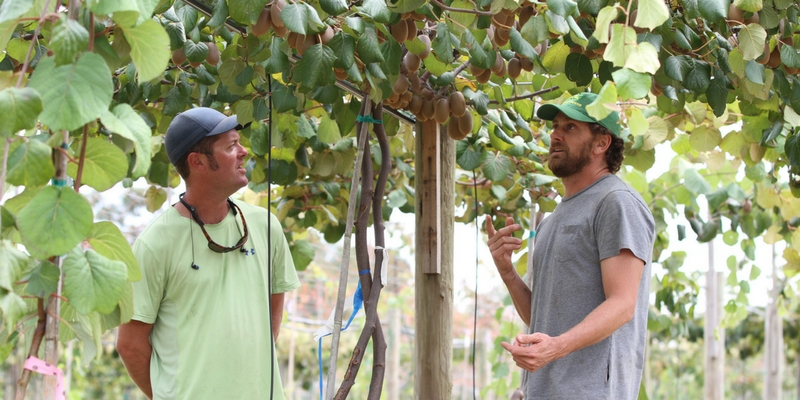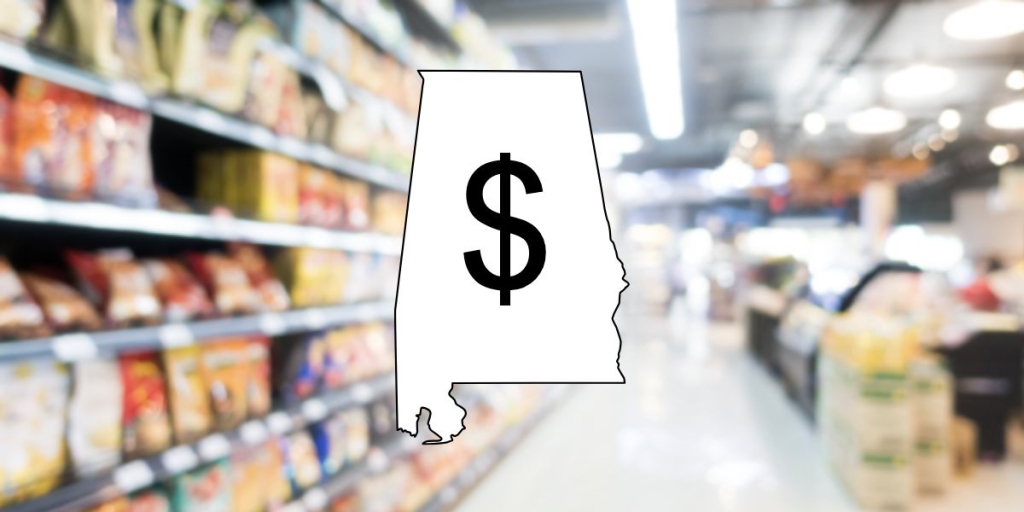
REELTOWN – A small community in eastern Alabama is home to the nation’s only commercial golden kiwifruit orchard, an innovative operation that could lead the way in establishing a new specialty crop for growers across the Southeastern U.S.
The Southeast Kiwi Farming Cooperative, established in 2014 and located in Tallapoosa and Macon counties, grows varieties of golden kiwifruit developed and patented at nearby Auburn University, and aims to export them to far-flung global markets.
Golden kiwifruit, in contrast to its green counterpart, has bright yellow flesh and smooth, not fuzzy, skin. It also has a sweeter, more mellow flavor than the tart taste of green kiwifruit.
“The goal is to get it overseas to places like Japan and Southeast Asia where gold kiwifruit is in high demand,” said Clint Wall, co-op vice president and manager.
EXPORT ‘HIGHWAY’
To launch the developing orchard, the horticulture graduate of Auburn’s College of Agriculture is drawing his on eight years of experience working in New Zealand, a global hub of kiwifruit production.If the orchard is successful, it could also boost the fortunes of other fruit and vegetable growers across Alabama.
Kiwifruit is extremely profitable, particularly golden kiwifruit, Wall said. Once the orchard’s vines mature, a sophisticated, post-harvest system will be installed to pick, pack, process and cool the kiwifruit in preparation for shipment overseas.
That same system could also be used for peaches, satsumas, blueberries and other Alabama-grown produce to follow a similar path.
“I think it’s time that that sort of intensity is brought to the fruit growing sector here in Alabama,” Wall said. “You know those Chilton County peaches that run down your chin when you take a bite? There could be a huge export market for them.
“If we pave a road for our fruit to Japan, we can put other things on that highway.”
AUBURN CONNECTION
So just how did a kiwifruit orchard come to be in Alabama?
Wall says he gets a few strange looks when he tells people what he does for a living.
“People are usually just surprised that kiwifruit grow in Alabama. They think it’s tropical, but it’s not. It doesn’t grow in a tropical climate,” he said.
China is the world’s largest kiwifruit producer, while Italy and Chile are also major players in the global industry. New Zealand has a fairly small footprint of total acres devoted to kiwifruit, but the country is No. 1 in production per acre.
In the U.S., all kiwifruit orchards are in California, except for the Southeast Kiwi Farming Cooperative in Reeltown.
Alabama and kiwifruit connect through Auburn, where horticulture professor Billy Dozier has long pursued a dream to turn kiwifruit varieties he has patented into a viable niche crop for Southeastern growers.
Several years ago, Dozier, along with nursery owners and brothers Wayne and Jimmy Bassett, formed Gold Kiwi Group LLC, with the exclusive right to propagate, grow and sell five patented cultivars Dozier and others developed at Auburn.
The partners bought land for the orchard from former Auburn football coach Pat Dye. They then tapped Wall, who wanted to return to the U.S. to be closer to family, to run the operation.
A former student of Dozier’s, Wall used his industry connections to help land the support of investor Sun Pacific, the largest kiwifruit producer in the U.S. The Reeltown orchard is the company’s first foray into golden kiwifruit.
GROWTH AREA
A recent study by the global kiwifruit industry identified the Southeastern U.S. as a possible new growth area, specifically a swath running through Alabama and into Georgia and South Carolina.
Among the benefits of the region are a frost-free growing season, abundant rainfall, plenty of lakes and rivers and a favorable soil profile. Another plus is that the U.S. has never had an outbreak of a devastating bacterial canker that nearly wiped out the global kiwifruit supply in 2011.
The study results did not surprise Wall.
“I always kind of knew that. Auburn has been growing kiwifruit at the Alabama Agricultural Experiment Station’s Chilton Research and Extension Center near Clanton since the mid-1980s. It was just never commercialized,” he said.
The Reeltown operation is still in the development phase, since it takes about four years for a kiwifruit vine to produce well. Currently, the orchard has about 40 acres of vines that are that age, but it won’t fully produce on all of its 180 acres until 2022.
CREATING A PATHWAY
The coming year will be one of experimentation, Wall said, as he tries to figure out some growing issues with the help of graduate students from Auburn. They plan to study the use of trap crops, rotating organic and non-organic pesticides and how to improve pollination using both honey bees and bumble bees.
“By 2019, we would like to make an informed decision about how we proceed,” he said. “Do we plant more acres? Do we not? Do we try to do it somewhere else? It will be an interesting couple of years.”
If the Southeast Kiwi Farming Cooperative is successful and has to create the infrastructure to get its products to market, Wall said he would love to see other Alabama-grown commodities go to market through a similar pathway.
“It’s a big world with high demands out there, and it would be unfortunate for such fantastic commodities to be undervalued by keeping them here,” he said. “We could introduce them to a greater audience, which would be thrilled, and that thrill is going to turn into dollars.”
(By Dawn Azok, Courtesy Made in Alabama)












